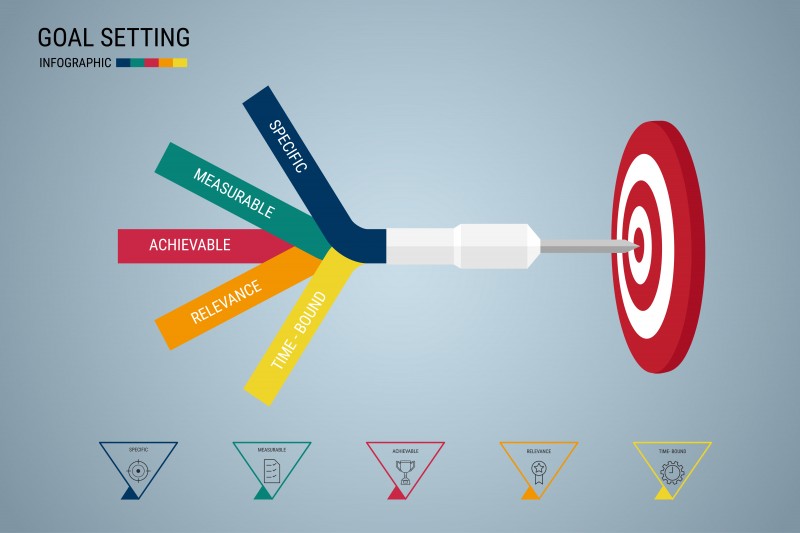
It’s that time of year again; everywhere you look, people are talking about resolutions and making big changes.
On one hand, I want to cheer them on because who doesn’t want people to succeed? On the other hand, it’s frustrating because over and over again I see people making vague plans that make no sense and have no direction. They set themselves up to fail, whether knowingly or unknowingly (more on that in another post).
RELATED: More Nutrition "Facts" Debunked
What can they, and coaches, do differently?
SMART Goals
I’m pretty certain most of us have heard about setting SMART goals at some point in our lives. However, I don’t know that people have actually used them when setting training and competition goals. There’s a ton of research out there that shows goal setting is effective for athletes of all sports and levels.
So, why don’t more people set goals?
What I’ve noticed is people start out with vague goals and when it doesn’t always work, they get frustrated and stop using them. Perhaps if they understood how to create SMART goals, they would get more out of their goals.
SMART = Specific, Measurable, Achievable, Relevant, and Timely.
There are a few ways this acronym is used, but this is how I use it:
Specific: What is your goal? Think what, when, and how much.
Measurable: How will you know when you’ve reached it? Can you track progress? How will you track progress?
Achievable: Realistically, can you achieve this goal (more in the next section)?
Relevant: Does this goal fit for what you want to accomplish?
Timely: When do you want to achieve your goal? Is it achievable in this timeframe?
Now that you understand what a SMART goal is, it’s time to look at outcome, performance, and process goals. This is where you’ll use the SMART goal standards.

chaliya © 123rf.com
Outcome, Performance, and Process Goals
Outcome goals are your overall goals, of which there are two types: Performance and Mastery. Performance goals are based on your results compared to other’s results. For instance, getting first place at a competition. Mastery goals refer to goals that seek to increase your own abilities, such as increasing your total by 30 pounds at the May competition. Neither are wrong, but there is something to be said about the level of expectation and disappointment that comes with always comparing yourself to the other competitors. It’s important to understand that you have no control over what others bring to the competition.
Performance goals also let you know you’re on track for your outcome goals. They can be looked at as interval goals that you want to meet on the way to your outcome goals.
Lastly, process goals help you decide how you’re going to accomplish your performance and outcome goals. This could be deciding how often you’ll train, what training program to use, or what you’ll eat.
Here is an example: Your general goal is to get stronger.
Outcome Goal: Increase my total by 30 pounds in six months.
Performance Goals: Increase my total by 5 pounds each month.
Process Goals: Train 4x week using conjugate provided by my coach. Do 30 minutes of conditioning 3x week.
Let’s check to make sure this is a SMART goal, too. Does it tell you what, how, and when (Specific)? Does it explain how you know you’re on track (Measurable)? Is this a realistic goal; can you actually achieve it (Achievable)? Does this goal fit with your overall goal of getting stronger (Relevant)? Did you state the timeframe for this goal (Timely)?
It looks like this meets all the criteria. Don’t forget to take time to revise your goals as things change, because they will. Also, you can set goals for training, competition, and both short and long term goals using this same outline.
Priorities
I wanted to quickly go over how to do goal-setting when you have lots of other priorities. Try this: Get out a piece of paper and write down EVERYTHING you do routinely; all of your responsibilities.
Now, rank them in order of most important to least important.
I’m willing to bet for most of us, our sport is not the number one priority in our lives. Do we wish it could be? Yes, but is that realistic for everyone? No. Let me tell you about my problem with priorities.
I’m a competitive powerlifter. I love competing, but I hate training (I know, I know, I’m odd). I’m married, have a three-year-old daughter, own two businesses, and am working on my Doctorate degree. On top of that, this past year my daughter started daycare and we’ve been sick off and on all year. Where do you think powerlifting training has come into play on my list of priorities? Not very high.
I’ve heard so many people say that you just have to make it a priority. Sure, that works for some people, but it’s not realistic for most people to keep up. This is where you really need to check-in on the “Achievable” standard in your SMART goals.
After every competition, I would be super excited to get back in and train for my next one! I would do my SMART goals based on what I wanted to do. It actually looked a lot like the example I showed you above. I always had the best intentions, but every time I would get frustrated because it wasn’t realistic for me. Eventually, I learned to adjust my goals based on family, school, sickness, or work. Once I learned to take a good hard look at whether my goals were realistic, I was able to make goals I could achieve, which helped me actually stay on track.
The moral of this story is we all want to be the best athlete we can in our sport because it’s part of our nature. Then again, goals only work if you’re honest with yourself about where you’re at. If you’re working with a coach it can be even more difficult because many times, we’re afraid to admit we can’t be 100%. However, a good coach is going to understand and create a program that fits what you’re capable of doing. For me, I know I don’t have more than an hour to train each day, so my coach and I created goals based around this and he writes my program to fit this.
Will I be as strong as someone who has two hours to train? I’m not sure, but at least this way I get the major movements and accessories in rather than blowing it all off and doing nothing. Nonetheless, make sure you’re taking your other priorities into account when you write your goals. This way you’ll be more successful in the long run.
Header image credit: Chakrit Thongwattana © 123rf.com
Tarra is a competitive powerlifter, licensed professional counselor, and a mental skills coach. She became interested in the intersection between mental health and sport while on active duty Air Force. She began working with her husband, Ryan, on mental skills coaching while he was preparing for his bodybuilding competitions. Tarra began to apply what she was learning in school to herself and Ryan. Together, they opened Rhino’s Gym and Tarra became involved in powerlifting and strongman. She established Team Rebelle, an all-female powerlifting team in Fayetteville, NC, which then morphed into a co-ed strength team, Team Chubby Unicorns.











What impresses me is that a good part of people have never heard about SMART goal-setting. I personally was bombarded with that stuff during my education as an Occupational Therapist, to the point that I even got sick of hearing about it... however, our SMART acronym stood for different things: Specific, Measurable and Time-Bound were the same, but our A was for "Action-oriented" and the R was for "realistic". I think this makes more sense for therapeutic use, but it can also be carries over to lifting.
Instead of saying "I want to get a stronger bench press" you would set the goal "I want to bench 300 lbs at the competition in 3 months". Now of course, this is very specific, but if it is realistic/achievable for you might be different. If your current max is 275 lbs with a pause, you should have no worries. But what if it's 260 lbs, touch'n'go, and very shaky? A 40 lbs increase isn't unheard of, but I guess you'd really need to work on form AND strength...
Therefore, might I suggest an article about setting realistic goals? Or rather, being realistic in training at all. Some people only watch Instagram-athletes and that heavily tweaks their perception on what's good progress. Not everyone can squat 500 lbs in their first year of training...
Thanks for your insightful article however, Tarra!
Dave - I certainly agree with your comments regarding setting realistic goals. I've noticed many newer and uncoached athletes setting themselves up for failure by setting goals that are WAY out of their league in a short amount of time. I've also seen coaches push these goals as a way to keep money coming in by feeding to their athlete's egos. It's very important for the success and safety of our athletes that we help them set realistic goals. I will work on an article for this.
Mike - Setting both short and long term goals is the best way to do it! That way it keeps the confidence and motivation up for athletes as they hit short term goals, which will keep their mind in the game for the long term ones.
Thank you both again!
Tarra